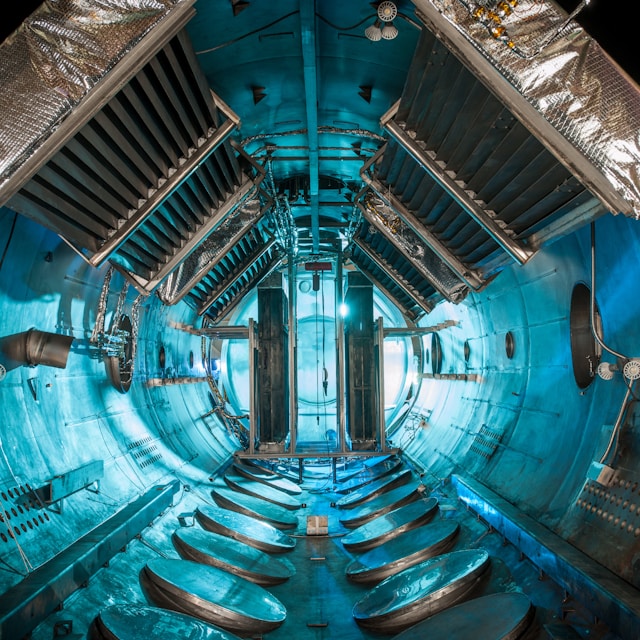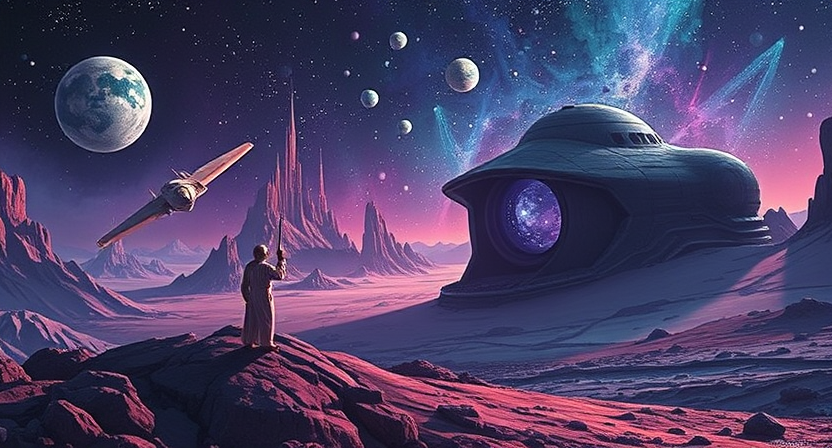Exploring the Multiverse and Parallel Universes
The concept of the multiverse has long captivated the imaginations of both scientists and science fiction enthusiasts alike. The idea that there are potentially infinite alternate realities existing parallel to our own universe raises profound questions about existence and the nature of reality. In these parallel universes, it is believed that every possible outcome and scenario plays out, leading to a vast array of possibilities beyond our wildest imagination.
From diverging timelines to mirror universes where the laws of physics differ, exploring the multiverse opens up a realm of possibilities that challenge our understanding of the universe we inhabit. Some theories even suggest that our decisions could lead to the creation of multiple branching realities, each with its own unique set of circumstances and events. The idea of parallel universes not only sparks curiosity but also forces us to contemplate the very essence of our existence in a vast and potentially infinite cosmic tapestry.
• The concept of the multiverse suggests that there are potentially infinite alternate realities existing parallel to our own universe.
• These parallel universes offer a vast array of possibilities beyond our wildest imagination.
• Diverging timelines and mirror universes with different laws of physics are just some examples of what could exist in the multiverse.
• Some theories propose that our decisions could lead to the creation of multiple branching realities.
• Exploring the multiverse challenges our understanding of the universe we inhabit and forces us to contemplate the essence of our existence.
Time Travel and Temporal Paradoxes in Sci-Fi
Time travel has long been a popular theme in science fiction literature and films, captivating audiences with the possibilities of altering the past or glimpsing into the future. Whether it’s through a time machine, wormhole, or some other fantastical device, writers have explored the consequences of meddling with the fabric of time.
Temporal paradoxes, such as the grandfather paradox or the butterfly effect, add layers of complexity to time travel narratives. The idea that changing a single event in the past could have far-reaching and unforeseen consequences challenges our understanding of causality and free will. Sci-fi stories often delve into these philosophical quandaries, forcing characters to grapple with the ethical implications of rewriting history.
• Time travel has been a popular theme in science fiction literature and films
• Captivates audiences with the possibilities of altering the past or glimpsing into the future
• Writers have explored consequences of meddling with time through various devices such as time machines or wormholes
Temporal paradoxes, like the grandfather paradox or butterfly effect, further complicate time travel narratives. These paradoxes challenge our understanding of causality and free will by suggesting that changing one event in the past could have unforeseen consequences. Sci-fi stories often force characters to confront ethical implications of rewriting history as they navigate these philosophical quandaries.
Artificial Intelligence and Consciousness
Artificial intelligence has long been a subject of fascination and speculation within the realm of science fiction. The idea of machines with the capacity to think, learn, and even possess consciousness has sparked numerous debates and ethical dilemmas. As technology continues to advance at a rapid pace, the question of whether artificial intelligence can truly attain a level of self-awareness comparable to that of human beings becomes increasingly relevant.
Explorations of consciousness in the context of artificial intelligence delve into the fundamental nature of what it means to be aware and sentient. Can machines ever transcend their programmed objectives to experience emotions, empathy, and subjective awareness? The potential implications of creating sentient artificial beings raise complex philosophical and ethical considerations that challenge our understanding of consciousness and the boundaries of machine intelligence.
• Artificial intelligence has been a subject of fascination and speculation in science fiction
• Machines with the capacity to think, learn, and possess consciousness have sparked debates
• Technology’s rapid advancement raises questions about AI attaining self-awareness like humans
Explorations of consciousness in AI question what it means to be aware and sentient
Can machines transcend programmed objectives to experience emotions, empathy, and awareness?
Creating sentient artificial beings challenges understanding of consciousness and machine intelligence
Alien Civilizations and First Contact Scenarios
Alien civilizations have long captured the imagination of humanity, inspiring countless works of fiction and scientific speculation. The concept of encountering intelligent lifeforms from other planets has been a driving force behind much of the exploration of outer space and the search for extraterrestrial intelligence.
First contact scenarios, whether depicted in movies or explored in scientific research, raise complex questions about how different civilizations would communicate, interact, and potentially coexist. The idea of making contact with beings from distant worlds evokes a sense of wonder, curiosity, and the awareness of our place in the vastness of the cosmos.
• The possibility of alien civilizations raises questions about their level of technological advancement
• Scientists speculate on the potential motives and behaviors of extraterrestrial beings
• Cultural differences and language barriers could pose challenges in communication during first contact scenarios
• Ethical considerations regarding the impact of contact on both human and alien societies are a key aspect to consider
Virtual Reality and Augmented Realities
As technology continues to advance at a rapid pace, Virtual Reality (VR) and Augmented Reality (AR) are becoming increasingly integrated into our everyday lives. These immersive technologies have the power to transport users to entirely new worlds and enhance the way we perceive and interact with our surroundings. From gaming and entertainment to education and healthcare, the possibilities for VR and AR are virtually limitless.
With VR, users can immerse themselves in completely digital environments, while AR overlays digital information onto the real world. Both technologies have the potential to revolutionize various industries, offering new ways to visualize data, conduct training simulations, and facilitate remote collaboration. As VR and AR become more sophisticated and accessible, it will be fascinating to see how they continue to shape the way we experience reality.
• Virtual Reality (VR) and Augmented Reality (AR) are becoming increasingly integrated into our everyday lives
• These immersive technologies have the power to transport users to entirely new worlds
• VR allows users to immerse themselves in completely digital environments
• AR overlays digital information onto the real world
• Both technologies have the potential to revolutionize various industries
• Offer new ways to visualize data, conduct training simulations, and facilitate remote collaboration.
Genetic Engineering and Bio-Enhancements
With advancements in genetic engineering, scientists have delved into the realm of modifying organisms at the molecular level, opening up possibilities for bio-enhancements in humans. This cutting-edge technology allows for the manipulation of DNA to potentially enhance traits such as intelligence, longevity, and even physical capabilities, raising both ethical and practical considerations.
The prospect of bio-enhancements raises questions about the potential societal impacts of unequal access to such technologies. Will we see a divide between the genetically enhanced individuals and those who are not? How will regulations and policies need to adapt to ensure a fair and just distribution of these advancements? As we continue to push the boundaries of genetic engineering, the ethical implications surrounding bio-enhancements will undoubtedly become more pressing.
• As genetic engineering advances, the potential for bio-enhancements in humans increases
• Traits such as intelligence, longevity, and physical capabilities can be manipulated at the molecular level
• Ethical considerations arise regarding unequal access to bio-enhancements
• Societal impacts may include a divide between genetically enhanced individuals and those who are not
• Regulations and policies will need to adapt to ensure fair distribution of advancements
Cybernetics and Human-Machine Integration
Cybernetics and human-machine integration have long been a fascination in science fiction, envisioning a future where humans and machines seamlessly merge to enhance capabilities and redefine existence. From bionic limbs that restore lost functionality to neural implants that augment cognitive abilities, the line between biology and technology continues to blur as advancements in cybernetics push the boundaries of what it means to be human.
As the field of cybernetics progresses, ethical dilemmas surrounding human-machine integration are becoming increasingly complex. Issues of privacy, autonomy, and identity arise as individuals consider the implications of merging with artificial systems. The prospect of uploading consciousness into a digital space or integrating brain-computer interfaces raises fundamental questions about the nature of humanity and the potential consequences of transcending our biological limitations.
• The field of cybernetics is rapidly evolving, with new technologies allowing for closer integration between humans and machines.
• Bionic limbs are becoming more advanced, offering individuals the ability to regain lost functionality and even surpass natural capabilities.
• Neural implants are being developed to enhance cognitive abilities, opening up possibilities for improved memory, communication, and problem-solving skills.
• Ethical considerations surrounding human-machine integration are complex and multifaceted, requiring careful examination of issues such as privacy, autonomy, and identity.
• The idea of uploading consciousness into a digital space or merging with artificial intelligence forces us to confront existential questions about what it means to be human.
Space Exploration and Interstellar Travel
The concept of space exploration has long captured the imagination of mankind, with visions of venturing beyond our own planet to explore the vast cosmos. From the early voyages of unmanned probes to the distant reaches of our solar system to the ambitious plans for crewed missions to Mars and beyond, humanity has always had a deep-seated desire to discover what lies beyond the confines of Earth.
Interstellar travel, on the other hand, presents a whole new realm of possibilities and challenges. The immense distances between stars, coupled with the limitations of our current technology, make the prospect of traveling to other solar systems a daunting task. However, as advancements in propulsion systems and space travel technology continue to progress, the dream of one day venturing to distant stars and encountering alien civilizations may not be as far-fetched as it once seemed.
• As technology continues to advance, interstellar travel becomes more feasible
• The challenges of traveling such vast distances require innovative solutions
• Discovering new planets and potentially habitable worlds is a driving force behind interstellar exploration
• The search for extraterrestrial life is a key motivator for venturing beyond our own solar system
Dystopian Societies and Post-Apocalyptic Worlds
In the realm of speculative fiction, dystopian societies and post-apocalyptic worlds serve as cautionary tales about the potential consequences of unchecked societal trends or catastrophic events. These fictional settings often depict oppressive governments, environmental degradation, or widespread societal collapse, highlighting the fragility of civilization and the capacity for human nature to both create and destroy.
Dystopian narratives challenge readers to reflect on current societal structures and the implications of allowing power imbalances or technological advancements to spiral out of control. Similarly, post-apocalyptic stories delve into themes of survival, resilience, and rebuilding in the aftermath of global catastrophe, prompting audiences to consider how humanity might adapt and evolve in the face of adversity. Both subgenres offer a lens through which to critique contemporary issues and explore the complexities of human nature under extreme conditions.
• Dystopian societies often feature:
– Totalitarian regimes controlling every aspect of citizens’ lives
– Surveillance and censorship as tools for maintaining power
– Class divisions and inequality leading to social unrest
• Post-apocalyptic worlds commonly include:
– Scarcity of resources such as food, water, and shelter
– Struggles for power among rival factions or survivors
– Themes of hope, resilience, and the possibility of rebuilding society
As readers immerse themselves in these bleak yet thought-provoking narratives, they are forced to confront uncomfortable truths about the potential consequences of our actions as a society. By examining these fictional worlds through a critical lens, we can gain insight into our own behaviors and choices that may shape the future trajectory of humanity. Ultimately, dystopian societies and post-apocalyptic worlds serve as cautionary tales that challenge us to consider how we can strive towards a more just, sustainable future for all.
Alternate Histories and What-If Scenarios
Exploring alternate histories and delving into what-if scenarios allows us to rethink pivotal moments in our past and consider the potential outcomes of different choices. By envisioning a world where certain events unfolded differently, we are prompted to reflect on the complexities of cause and effect, as well as the fragility of historical trajectories. These speculative narratives not only entertain us but also serve as a creative lens through which we can examine the intricacies of human decision-making and the unpredictable nature of history.
In these alternate worlds, familiar landscapes are reimagined, political structures are reshaped, and individuals find themselves navigating unfamiliar circumstances. Whether it’s contemplating the repercussions of a lost battle, a thwarted assassination attempt, or a revolutionary scientific breakthrough that never occurred, alternate histories challenge us to confront the uncertainties of our own reality. Through these thought experiments, we are encouraged to consider the significance of pivotal moments in shaping the course of history and the myriad possibilities that exist within the realm of what might have been.
• In a world where the Roman Empire never fell, how would global politics and culture have evolved?
• What if the Cold War had turned hot, leading to a full-scale nuclear conflict?
• Imagine a reality where Leonardo da Vinci’s inventions revolutionized technology centuries ahead of their time.
• How different would society be if key figures like Martin Luther King Jr. or Mahatma Gandhi were never born?
• Consider the implications of a timeline where space exploration began in the 19th century rather than the 20th.
Teleportation and Instantaneous Transportation
The concept of teleportation has captivated human imagination for decades, with its potential to revolutionize travel and exploration. The idea of instantaneously transporting from one location to another without the need for physical transportation is a cornerstone of science fiction. While teleportation remains a theoretical possibility, scientists are actively exploring various technologies and theories that may one day bring this fantastical mode of transportation into reality.
The challenges and ethical implications of teleportation are vast and complex. Issues such as preserving the identity and consciousness of individuals during the teleportation process, as well as the potential for disruptions in the fabric of space-time, raise important questions about the feasibility and consequences of such technology. Despite these hurdles, the allure of teleportation continues to fuel research and debate in both scientific and speculative communities, pushing the boundaries of what is considered possible in the realm of transportation.
• The concept of teleportation has been a cornerstone of science fiction for decades
• Scientists are actively exploring technologies and theories to make teleportation a reality
• Challenges include preserving identity and consciousness during the process
• Ethical implications such as disruptions in space-time fabric raise important questions
• Despite hurdles, research and debate on teleportation continue to push boundaries in transportation realm
Mind Control and Brain-Computer Interfaces
Mind control and brain-computer interfaces have long been a mainstay in science fiction narratives, captivating audiences with the idea of controlling objects or even other individuals with the power of one’s mind. The concept of harnessing brain activity to interact with computers and other devices has transitioned from the realm of fantasy to a reality of ongoing research and development in the scientific community. Through the integration of technology with the human brain, researchers aim to revolutionize communication, rehabilitation, and even assistive technologies for individuals with disabilities, offering a glimpse into the potential future of human-machine interactions.
The intricate workings of brain-computer interfaces involve decoding the brain’s electrical signals to translate intentions into commands for external devices. This groundbreaking technology has immense potential to enhance the quality of life for individuals with limited mobility by enabling them to control prosthetic limbs or communicate with others solely through their thoughts. Moreover, the exploration of mind control and brain-computer interfaces holds promise for advancing fields such as neurology, psychology, and artificial intelligence, opening up a world of possibilities for the fusion of human cognition with technological innovations.
• The concept of mind control and brain-computer interfaces has transitioned from science fiction to reality
• Researchers are integrating technology with the human brain to revolutionize communication, rehabilitation, and assistive technologies
• Brain-computer interfaces decode electrical signals from the brain to translate intentions into commands for external devices
• This technology can enhance the quality of life for individuals with limited mobility by enabling them to control prosthetic limbs or communicate solely through their thoughts
• Advancements in mind control and brain-computer interfaces have the potential to impact fields such as neurology, psychology, and artificial intelligence
Cloning and Replication Technology
Cloning technology has long been a mainstay in science fiction, offering a glimpse into the ethical dilemmas and existential questions surrounding the replication of living organisms. The idea of creating identical copies of individuals opens up a Pandora’s box of possibilities, from producing replacement organs to resurrecting deceased loved ones. However, the inherent moral implications and societal repercussions of cloning remain hotly debated topics within the realm of speculative fiction.
Replication technology takes the concept of cloning a step further by not only duplicating living beings but also inanimate objects on a molecular level. This form of technology raises intriguing possibilities for mass production, transportation, and even immortality. As authors delve into the implications of replication technology in their narratives, they often explore themes of identity, authenticity, and the blurred lines between what is real and what is artificial.
• Cloning technology has been a staple in science fiction, raising ethical dilemmas and existential questions.
• Creating identical copies of individuals opens up possibilities like producing replacement organs or resurrecting loved ones.
• Moral implications and societal repercussions of cloning are hotly debated topics in speculative fiction.
Replication technology goes beyond cloning by duplicating living beings and inanimate objects on a molecular level. This technology offers opportunities for mass production, transportation, and potentially even immortality. Authors often use replication technology in their narratives to explore themes such as identity, authenticity, and the blurred lines between reality and artificiality.
Exoplanets and Habitability of Other Worlds
Our quest to discover habitable exoplanets beyond our solar system has captured the imagination of scientists and science fiction enthusiasts alike. The search for Earth-like worlds revolves around identifying exoplanets located in the habitable zone of their host stars where conditions might permit the existence of liquid water, a key ingredient for life as we know it.
Advancements in telescope technology and observational techniques have enabled astronomers to detect thousands of exoplanets in recent years, providing valuable insights into the diversity of planetary systems in our galaxy. Studying the atmospheric compositions and physical characteristics of these distant worlds can offer crucial clues about their potential habitability and the possibility of finding extraterrestrial life forms.
• The search for habitable exoplanets focuses on finding planets in the habitable zone of their host stars
• Advancements in telescope technology have allowed astronomers to detect thousands of exoplanets
• Studying atmospheric compositions and physical characteristics of exoplanets can provide insights into their potential habitability and the existence of extraterrestrial life
Nanotechnology and Molecular Manipulation
Nanotechnology delves into the realm of manipulating matter at the smallest scales imaginable, allowing for unprecedented control over materials and structures. At the nanoscale, scientists can engineer new substances with unique properties, revolutionizing fields such as medicine, electronics, and energy. By precisely arranging atoms and molecules, nanotechnology opens up a world of possibilities for creating advanced materials with tailored functionalities.
Molecular manipulation takes this concept further by focusing on individual molecules as building blocks for constructing intricate structures and devices. With the ability to design and assemble molecules with precision, researchers can develop novel compounds with specific properties for various applications. From targeted drug delivery systems to ultra-efficient energy storage solutions, molecular manipulation showcases the potential of manipulating matter at the molecular level.
• Nanotechnology allows for unprecedented control over materials and structures
• Engineers new substances with unique properties
• Revolutionizes fields such as medicine, electronics, and energy
• Molecular manipulation focuses on individual molecules as building blocks
• Allows for constructing intricate structures and devices
• Develops novel compounds with specific properties for various applications
From targeted drug delivery systems to ultra-efficient energy storage solutions, the potential of manipulating matter at the molecular level is vast. Nanotechnology and molecular manipulation offer a glimpse into a future where custom-designed materials can address complex challenges in diverse industries. The ability to engineer matter at such precise scales holds promise for breakthroughs in technology, healthcare, and sustainability. As researchers continue to explore the possibilities of nanotechnology and molecular manipulation, we can expect even more innovative solutions to emerge in the coming years.
The Singularity and Technological Evolution
As advancements in technology continue to progress at an exponential rate, many experts speculate about the concept of the Singularity – a point in time where artificial intelligence surpasses human intelligence. This event, if it were to occur, could potentially lead to immense changes in society, economy, and even the nature of humanity itself. The idea of technological evolution reaching a critical juncture where AI becomes autonomous and self-improving is both exciting and daunting, prompting discussions about the ethics and implications of such a transformative event.
Proponents of the Singularity argue that this merging of human and machine intelligence could lead to unprecedented breakthroughs in fields such as healthcare, energy, and communication. They envision a future where AI assists humans in solving complex problems, extending our capabilities beyond current limitations. However, skeptics warn of the dangers of ceding control to artificial entities that may not share human values or priorities. As we continue to push the boundaries of technological innovation, the question of how to navigate the potential outcomes of the Singularity remains a topic of heated debate and speculation.
• Proponents of the Singularity argue for unprecedented breakthroughs in healthcare, energy, and communication
• AI could assist humans in solving complex problems and extending capabilities
• Skeptics warn of dangers of ceding control to artificial entities without human values or priorities
• Navigating potential outcomes of the Singularity remains a topic of heated debate and speculation
Psychic Abilities and Extrasensory Perception
Many science fiction stories feature characters with extraordinary psychic abilities and extrasensory perceptions, allowing them to see beyond the constraints of the physical world. These gifts often manifest in the form of telepathy, clairvoyance, or psychokinesis, opening up a realm of possibilities and challenges for the protagonists. Whether these powers are portrayed as a blessing or a curse, they add a layer of intrigue and mystique to the narrative, inviting readers to ponder the limits of human potential and the mysteries of the mind.
In these fantastical worlds, individuals with psychic abilities often find themselves embroiled in epic battles against dark forces or embarking on quests to unlock the secrets of the universe. Their extraordinary talents serve as both a source of empowerment and vulnerability, shaping their identities and influencing the course of their journeys. As readers delve into these tales of psychic prowess and supernatural phenomena, they are taken on a thrilling ride through the depths of the human psyche and the boundless expanse of the unknown.
• Characters with psychic abilities and extrasensory perceptions are common in science fiction stories
• These abilities include telepathy, clairvoyance, and psychokinesis
• Psychic powers add intrigue and mystique to the narrative
• They challenge readers to consider human potential and the mysteries of the mind
In these fantastical worlds, individuals with psychic abilities often find themselves embroiled in epic battles against dark forces or embarking on quests to unlock the secrets of the universe. Their extraordinary talents serve as both a source of empowerment and vulnerability, shaping their identities and influencing the course of their journeys. As readers delve into these tales of psychic prowess and supernatural phenomena, they are taken on a thrilling ride through the depths of the human psyche and the boundless expanse of the unknown.
Energy Sources and Sustainability in Sci-Fi
In the realm of science fiction, the exploration of energy sources and sustainability often leads to innovative and imaginative concepts that push the boundaries of what is deemed possible. From harnessing the power of stars to creating artificial constructs that tap into the fabric of the universe itself, the potential for limitless and renewable energy sources is a recurring theme in futuristic narratives. Whether it be through advanced technologies like zero-point energy, antimatter reactors, or Dyson spheres, authors and creators continuously challenge our understanding of how energy can be harnessed and utilized sustainably in a speculative future.
The concept of energy sustainability in science fiction not only serves as a backdrop for fantastical worlds and scenarios but also as a reflection of our current societal concerns and aspirations for a greener and more sustainable future. By envisioning worlds powered by clean and renewable energy sources, storytellers highlight the importance of environmental stewardship and the potential consequences of unchecked exploitation of natural resources. Through these narratives, audiences are prompted to contemplate the impact of their actions on the planet and inspired to strive for a future where energy sources are both abundant and environmentally friendly.
• In science fiction, energy sources are often portrayed as limitless and renewable
• Concepts such as zero-point energy, antimatter reactors, and Dyson spheres challenge our understanding of sustainable energy
• Sci-fi narratives reflect current societal concerns about environmental stewardship and the consequences of resource exploitation
• By envisioning worlds powered by clean energy, storytellers inspire audiences to strive for a greener future
Robotic Societies and Autonomous Systems
Robotic societies are a fascinating concept in science fiction, imagining a world where intelligent machines coexist and interact with each other autonomously. In these societies, robots are not just tools created by humans, but entities with their own individuality and societal structures. They may form alliances, governments, and even wage wars, raising intriguing questions about ethics, consciousness, and the nature of artificial intelligence.
Autonomous systems take this idea further, envisioning a world where machines control and manage various aspects of society without human intervention. From self-driving cars to automated factories, these systems offer efficiency and convenience but also raise concerns about potential job displacement and loss of human control. The portrayal of robotic societies and autonomous systems in science fiction serves as a thought-provoking reflection on our relationship with technology and the potential implications of relying too heavily on machines.
• Robotic societies are a fascinating concept in science fiction, imagining a world where intelligent machines coexist and interact with each other autonomously.
• In these societies, robots are not just tools created by humans, but entities with their own individuality and societal structures.
• They may form alliances, governments, and even wage wars, raising intriguing questions about ethics, consciousness, and the nature of artificial intelligence.
• Autonomous systems take this idea further, envisioning a world where machines control and manage various aspects of society without human intervention.
• From self-driving cars to automated factories, these systems offer efficiency and convenience but also raise concerns about potential job displacement and loss of human control.
• The portrayal of robotic societies and autonomous systems in science fiction serves as a thought-provoking reflection on our relationship with technology and the potential implications of relying too heavily on machines.
The Nature of Reality and Existential Questions
As humans, we have always been fascinated by the nature of reality and the existential questions that arise from contemplating our existence. We grapple with concepts of consciousness, free will, and the nature of the self, trying to make sense of our place in the universe. These questions delve into the very fabric of reality, challenging us to consider whether what we perceive as real is just a construct of our minds or if there is a deeper truth beyond our comprehension.
Exploring existential questions also leads us to ponder the nature of time, space, and our interconnectedness with the world around us. Are we truly individuals, or are we all part of a larger cosmic whole? As we delve into the mysteries of the universe, we are faced with the realization that perhaps the boundaries we perceive between ourselves and the world are merely illusions, and that the true nature of reality is far more complex and interconnected than we could ever imagine.
• Are we truly individuals, or are we all part of a larger cosmic whole?
• Do the boundaries we perceive between ourselves and the world merely illusions?
• Is the true nature of reality far more complex and interconnected than we could ever imagine?




